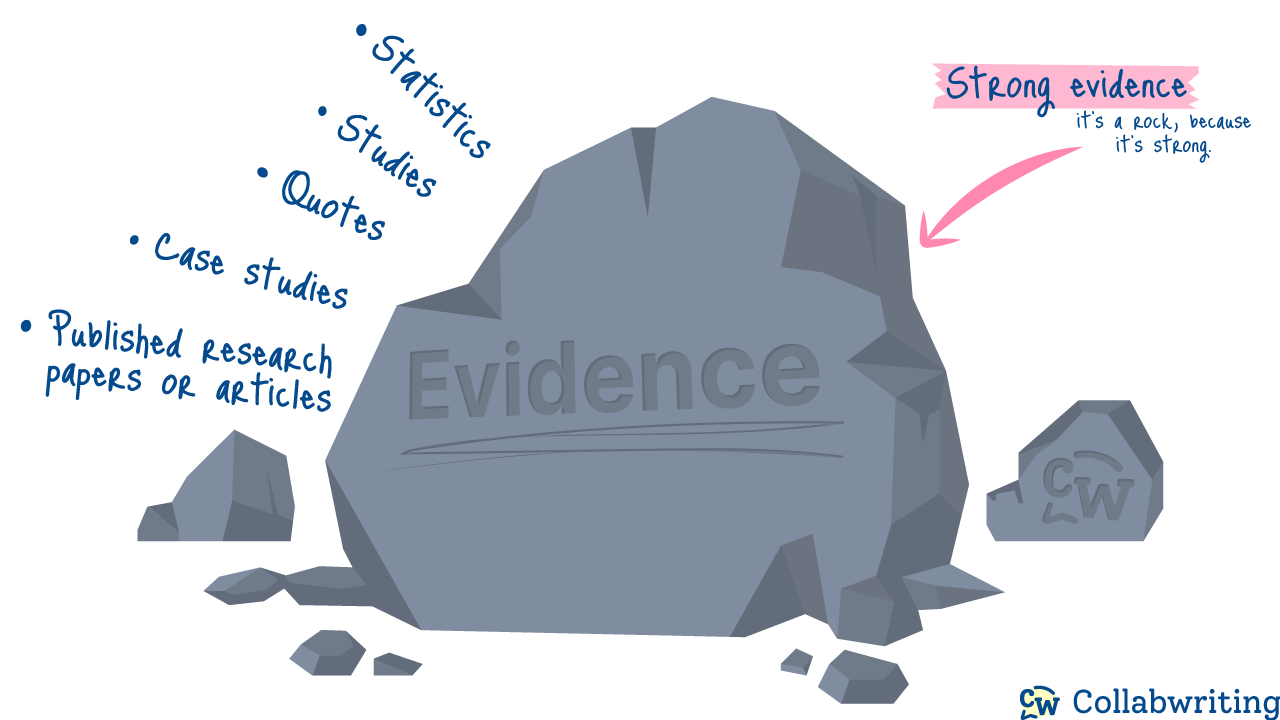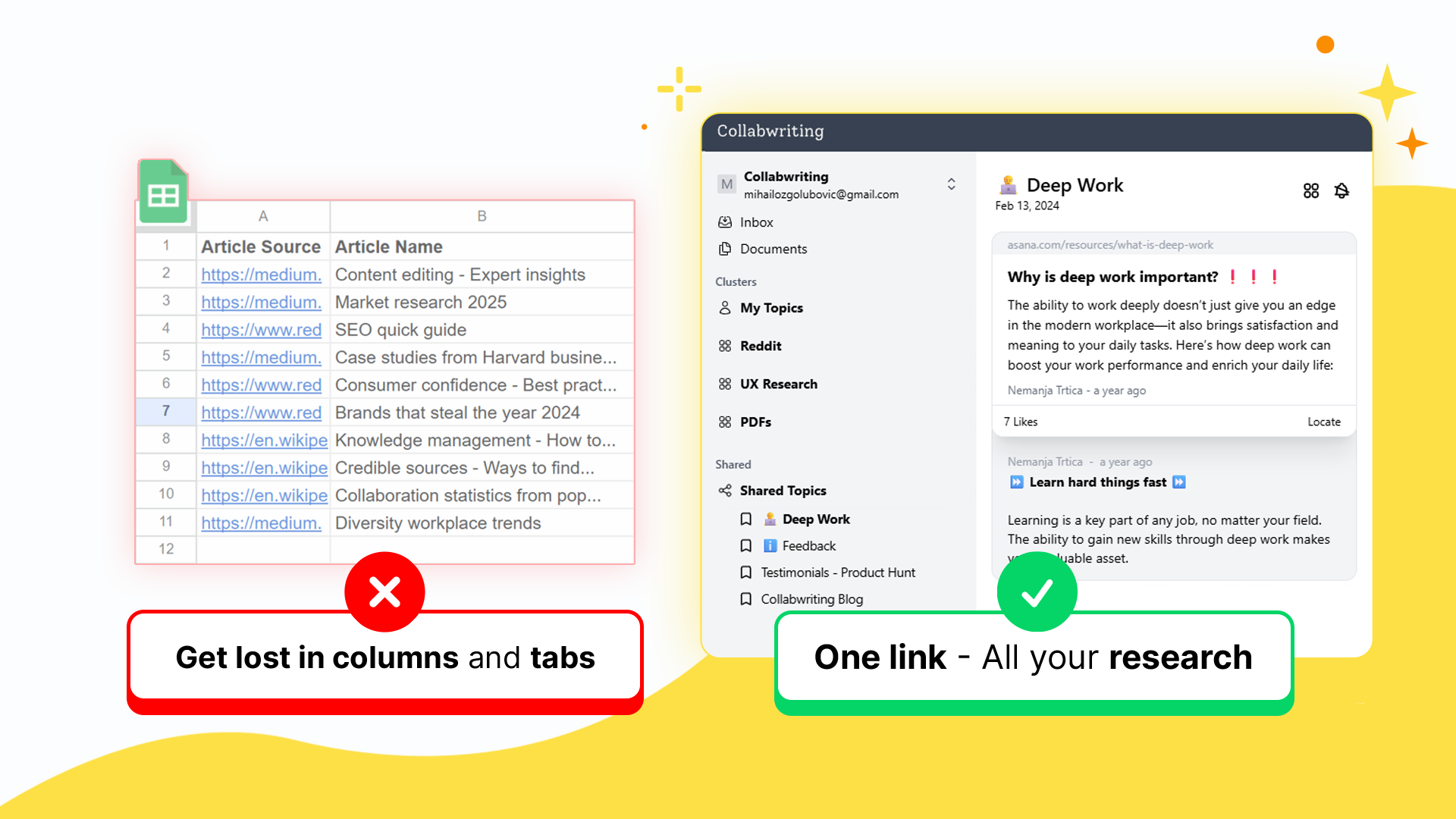In a world where opinions run wild and information overload is the norm, it's crucial to arm yourself with the most potent weapon in a writer's arsenal: solid evidence.
Whether you're writing an academic paper, a persuasive piece, or even a casual blog post, backing up your claims with trustworthy evidence is a must. Not only does it strengthen your arguments, but it also adds credibility to your writing.
Why is supporting evidence crucial?
Supporting evidence is the pillar of credibility for your argument or claim. Without it, you risk appearing ill-informed and weakening your stance.
Just like a building lacking a solid foundation, an argument without evidence collapses.
Have you ever found yourself engaged in a debate with a friend, where a quick Google search could settle the dispute? Or perhaps you've challenged someone with a simple, "Prove it," when they make a claim. These instances highlight the universal desire for evidence.
Unless we have concrete proof, we refuse to accept statements at face value.
This holds true for your readers as well.
When writing an essay or research paper, your audience looks for convincing and credible content. To meet this expectation, incorporating evidence is essential. By using evidence, you strengthen your arguments, making them more convincing and more likely to persuade your readers.
What is strong evidence?
When it comes to strong evidence, there are several key criteria to consider:
- Relevance - It should be directly related to the topic you're addressing in your content
- Credibility of the source - It's essential that your evidence comes from a trustworthy and reputable source
- Corroboration - Ideally, it should be supported by multiple sources to improve its validity
- Currency of information - In most cases, it is crucial to be current, reflecting the latest information and research
- Specificity - The evidence should be precise, avoiding generalizations to strengthen its impact
When incorporating evidence into your writing, don't forget that each piece requires a thorough explanation. Instead of letting your readers wonder, ask these questions:
- What does the information imply?
- How does it connect to your claim or thesis?
- Why does this evidence truly matter?
If you can't provide clear answers to these questions, it's a sign that your argument may be weakened. In such cases, seeking alternative evidence that will better support and strengthen your view is always a wise alternative.
Remember, compelling explanations behind your evidence serve as the backbone of a strong and persuasive argument.

Seeking evidence from reliable sources
We’ve already discussed how important it is to use strong evidence from credible sources. However, figuring out whether a source is credible can be tricky.
After all, inaccurate information from unreliable sources spreads quickly on social media, making it a significant issue.
To combat this, it's a good idea to use academic databases and search engines that filter out untrustworthy sources. Additionally, cross-referencing information from multiple sources can help validate its accuracy.
When unsure about a source's credibility, employing the RADCAB acronym can help source evaluation.
RADCAB represents a set of criteria to assess source reliability and it contains of:
- Relevancy
- Appropriateness
- Detail
- Currency
- Authority
- Bias
Here’s a closer look at each criterion:
Relevancy
When you start your writing, it’s essential to ensure that the information you collect is not just relevant but also closely aligned with your topic or question.
To do this, use specific search terms that produce highly relevant facts. But here’s the key: take the time to fully understand the meaning of the evidence you find.
Because it’s easy to mistakenly include off-topic or irrelevant evidence if you’re not fully focused. Stay sharp and on point, and you’ll see your writing flourish.
Appropriateness
It's crucial to find the perfect fit.
Imagine using a quote from a fictional novel to support a research paper is like showing up in a ball gown to a soccer match - totally out of place!
As a writer, it's key to start your research with a clear idea of what types of sources will best support your topic. Should you be looking for peer-reviewed scientific studies, primary sources, historical documents, or perhaps expert interviews?
Knowing the answer to this question from the outset will help you narrow your search and find the most valuable evidence for your piece.
Detail
When evaluating a source's quality, look for comprehensive coverage that delves deeply into your research topic.
Carefully examine the website's sitemap, in-text citations, Works Cited, titles, subheadings, and graphics to determine if it provides comprehensive and in-depth information.
Remember, specific details hold more weight than general information, so prioritize sources that provide specific insights.
Currency
Always consider the date of publication or update when evaluating your sources.
While older sources can be suitable for certain types of research, such as historical research, it's generally recommended to prioritize current and up-to-date evidence.
For instance, when writing about a contemporary medical topic, citing a study from 1993 wouldn't be ideal.
Stay current to ensure the relevance and accuracy of your information.
Authority
It's essential to look beyond evaluating the information itself. It's essential to also assess the expertise of the author, organization, website, or company.
Take a moment to ask yourself if they are qualified to educate others on the topic at hand. Ask yourself what credentials they possess.
By considering the background and expertise of the source, you can ensure that the information you include in your writing comes from reliable and knowledgeable individuals or entities.
Bias
It's essential to maintain a balanced and unbiased approach to your writing.
To do this, choose your sources carefully to avoid biased information. Such sources may have hidden motives or agendas that can undermine the objectivity of your paper.
Look closely at the tone, website name, author, and mission statement to spot any potential biases.
Additionally, cross-referencing information from multiple sources can help you achieve a well-rounded and impartial perspective in your writing.

What makes Collabwriting the go-to choice for collecting and assessing information?
As we've explored the importance of incorporating evidence to build trust with your readers, it's also essential to understand why writing teams are increasingly turning to Collabwriting for their research projects.
Imagine this: a team of skilled writers, researchers, and subject matter experts collaborating seamlessly, sharing knowledge, and working together in real-time.
Yes, it's possible with Collabwriting.
Collabwriting makes research feel like a shared adventure. Your team can swap ideas, share useful links, and evaluate sources together - like an ongoing brainstorming session where everyone adds fresh insights and inspiration along the way.
Gone are the days of fragmented information and isolated efforts. With Collabwriting, teams can centralize their research materials, putting an end to tedious individual searches.
The result?
A collection of carefully selected evidence that is thorough, clear, and convincing. By choosing Collabwriting, teams unlock the full power of collaboration, boosting their research capabilities and producing content that truly resonates with their audience.
Give it a try and you won't look back!






![Best Research Collaboration Tools in 2025: Zotero, Paperpile & Collabwriting [Compared]](/content/images/2025/07/image--7--1.png)







